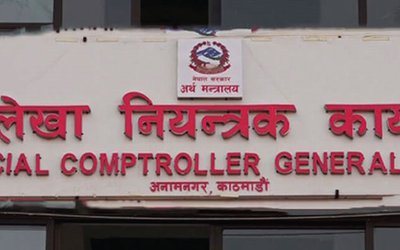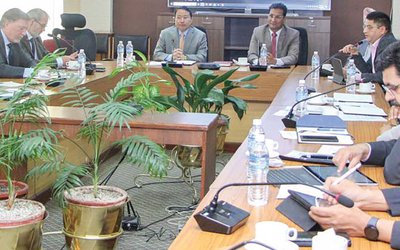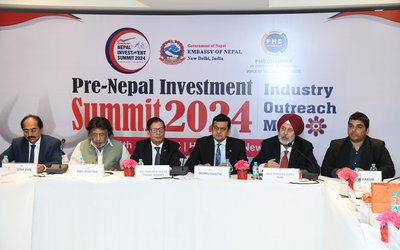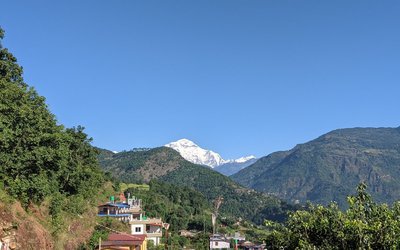Nepal’s import from India has increased dramatically, reaching 5.4 times more since 2009, when the two countries signed the present trade treaty. The recent agreement reached between the two countries to renew the treaty without taking any initiative to reduce the trade imbalance is likely to cause a major setback for Nepal.
Despite shortcomings in the seven-year treaty, it is automatically renewed on October 27, without any amendment. The Nepalese side had proposed some amendments but the two sides later agreed to renew it as it is.
According to the Trade Promotion Center, Nepal's import from India has skyrocketed by 12 times in the last seven years compared to its exports. Nepal imported goods worth Rs 214 billion from India in 2009/10, while its export to the southern neighbor was Rs 39 billion. Now, import from India has surged to 477 billion rupees while import has remained stagnant at 39 billion rupees in 2015/16.
With these data there, Nepal has communicated with India for the renewal of the treaty without any change. With India in no mood to change the treaty, Nepal has no option other than to budge. As Nepal-India relations are yet to improve fully following the last year's dispute, the environment is not conducive for amendment.
Although the treaty has so many good provisions to reduce the trade imbalance, Nepal’s failure to take concrete steps to identify the products with comparative advantages did not materialize the provision in Nepal’s favor.
Following the signing of the trade treaty in 1996, which was regarded as the best treaty in Nepal’s favor, Nepal’s exports to India had drastically increased. However, Nepal’s business community misused the provisions of that treaty and India proposed several amendments.
With many restrictions, Nepal-India signed another Trade Treaty in 2002 which imposed so many restrictions on Nepalese products. Nepal and India then signed another treaty in 2009. However, this treaty, which has a provision for automatic renewal, failed to accelerate Nepal’s export to India and narrow down the trade deficit.
“We are in the process of renewing the treaty and our ministry has already sent a proposal to India,” said Rabi Shankar Sainju, joint secretary at the Ministry of Commerce.
According to the provision in the treaty, either party of the treaty has to send proposals three months prior to the expiry date. As none of them has sent amendment proposals, it will renew automatically.
“Of course, there is the need to narrow down the trade deficit but the priority at the moment is to renew the treaty before it expires on October 27," said Sainju. “We will table those agendas in the Intergovernmental Committee in the days to come.”
Co-chaired by commerce secretaries of both the countries, the IGC meeting is expected to be held in Kathmandu later this year.
Private sector organizations expressed dissatisfaction over the decision. Led by Federation of Nepalese Chambers of Commerce and Industry (FNCCI), industrialists have submitted their agendas at the Ministry of Commerce for amendment to the treaty.
“Had Nepal government accepted our proposal for amendment, it would have led to a much better situation,” said FNCCI President Pashupati Murarka. "What we want is the permission to import third country goods from India and railway cargo containers through all customs points in addition to the Raxaul and Inland Container Depot. Along with saving billions of rupees in trading costs, this will also decrease the cost of raw materials thereby increasing competitiveness of Nepali products.”
Although India has agreed that its central government and state governments would not impose excise tax or any other taxes on Nepali goods, Nepalese products have been facing a lot of barriers and restrictions.
Nepalese exporters have been facing recurring trade barriers including quarantine, and quality certifications. The barriers in export of agricultural goods have not been removed yet. By refusing Nepal’s quality certification, Nepalese traders are compelled to go to Kolkata for such tests.
Activating the provisions of the treaty, India is barring the Nepalese products whenever they feel uncomfortable. Just last month, India briefly barred import of Nepali ginger citing pesticide residue in the Nepali cash crop.
At a time when the relations of both the countries are recovering slowly following last year's crisis, the automatic renewal of the treaty in itself is taken as a success for Nepal.
- TANAHU HYDROPOWER PROEJCT: A Significant Achievement
- Apr 15, 2024
- AMBASSADOR HANAN GODAR: Sharing Pain With A Nepali Family
- Mar 30, 2024
- VISIT OF KfW AND EIB TO NEPAL : Mission Matters
- Mar 25, 2024
- NEPAL BRITAIN SOCIETY: Pratima Pande's Leadership
- Mar 24, 2024
- NEPAL ARMY DAY: Time To Recall Glory
- Mar 15, 2024















